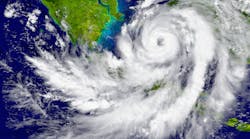The Chemical Safety Board (CSB) is cautioning businesses with chemical facilities to begin preparing for hurricane season months ahead of its start.
A new video and safety alert stresses the importance of emergency planning for severe weather events.
Katherine Lemos, CSB chairman said, “As the nation faces this year’s hurricane season, it is critical that the chemical industry understand and prepare for the potential safety hazards posed by extreme weather events.”
The materials were released as a result of a CSB investigation into the 2017 Arkema Chemical Plant fires.
According to the agency, the Arkema facility in Crosby, Tx. ignited after heavy rains from Hurricane Harvey flooded plant equipment which caused it to fail. As a result, stored chemicals at the facility began to decompose and burn which released fumes and smoke. Twenty-one people sought treatment for exposure to the fumes, and more than 200 residents were evacuated and could not return to their homes for a week.
Following an investigation, the CSB determined there was a "significant lack" of industry guidance for emergency preparation for severe weather events. The independent federal agency sought assistance from the Center for Chemical Process Safety (CCPS) to create materials and guidance to prevent further incidents.
The result is called the “Assessment of and Planning for Natural Hazards,” which provides an updated approach for assessing natural hazards, means to address the hazards, and emergency planning., according to the CSB.
Measures highlighted in the safety alert include the following precautions to take before startup:
- Use appropriate management-of-change (MOC) processes before modifying any startup procedures, equipment or staffing arrangements due to the impact of the hurricane.
- Make sure that adequate staffing and expertise are available before starting up, recognizing that human performance may be compromised due to crisis conditions.
- Use up-to-date startup procedures and ensure that the available staff are trained in how to execute them.
- Evacuate nonessential personnel (including personnel in trailers) until normal operating conditions are established.
In addition, equipment should undergo a thorough check. Company officials should examine large bulk storage tanks for evidence of floating displacement or damage; pressure vessels and small storage tanks for evidence of floating displacement or damage; insulation systems for piping, vessels, and tanks; sewers and drains; furnace systems; electric motors and drives; and switchgear, conduit, electrical boxes, electronic and pneumatic instrumentation, emergency warning systems, emergency equipment (e.g. eyewash stations, fire detection and suppression systems).

